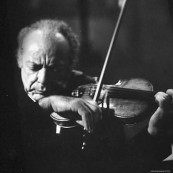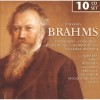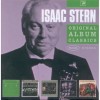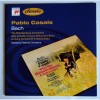| Voice/Instrument: | Violine |
Biography
Biography
Alexander (Sasha) was born Abram Sznejder. At 13 Abram almost died of tetanus after cutting his knee in an accident. The tetanus distorted his joints and recovery was long and painful. Sascha left Vilna in 1924 and joined his brother Mischa Schneider in Frankfurt, after securing a scholarship to study violin with Adolf Rebner, the principal violin tutor at the Hoch Conservatory. In 1927, Alexander became leader (concertmaster) of an orchestra in Saarbrücken. In 1929 he was appointed leader of the Norddeutscher Rundfunk Orchestra in Hamburg. In 1932, he lost his job as a result of the ongoing Nazi campaign against Jews - it would not be long before the time came to leave Germany.
Budapest Quartet
At this time, the Budapest Quartet, whose cellist was Sasha's brother Mischa, lost their first violinist. Although the quartet had not yet left Germany, they spent a lot of time out of the country, were self-exployed, and the Nazis had not yet caught up with them. For Sasha to join them was an ideal arrangement all round. Their existing second violinist, Josef Roismann, switched to first and Sasha joined as second. This was because Roismann was already comfortable with the other players whereas Sasha would need time to learn their repertoire and style.
In 1934 the Nazis made threats to the quartet and they left Berlin for Paris the next day, never to return to Germany again - even on tour. When war broke out in 1939 they happened to be on tour in the United States. They all obtained permission to stay and from then on made it their base.
Independence
Later on, Schneider felt the need to develop himself as an independent musician so he left the quartet in 1944, full of energy and ideas. He was offered a conductorship of the Metropolitan Opera, and leadership of the Pro Arte and Paganini Quartets but turned them down. He toured with Ralph Kirkpatrick; he formed the Albeneri Trio with Benar Heifetz and Erich Itor Kahn.
He studied with Casals in Prades. There he persuaded Casals to participate in a festival in 1949 to honour the two hundredth anniversary of Bach’s death. He supported Casals in further Bach festivals at Prades and Perpignan. And eventually, He´d conduct Casals´oratory The Manger (El Pessebre) in Guadalajara, Jalisco, Mexico, during Festival Casals de México, and he recorded it in 1973 in Puerto Rico.
Also in 1949 he formed a string quartet to perform and record all eighty-three of Haydn’s quartets. This was not completed because its sponsor, the Haydn Society, ran out of funds.
Schneider was a very sociable man with a wide circle of friends. He worked hard to promote chamber music with free or subsidised concerts.
Return to Quartet
In 1956 the quartet persuaded Schneider to rejoin them. They had tried two other second violinists (Ortenberg and Gorodetzky), neither of them able to reach Schneider's high standards, and Roismann had refused to continue with anyone else. Schneider had remained in close contact with the quartet and he stood in for Ortenberg or Gorodetzky when they were ill. Now it was agreed the quartet would operate part-time with Schneider and he would continue his independent career. They finally disbanded in 1967.
Other Work
Schneider was the Artistic Director of the Schneider Concerts at The New School (New York City), from 1957 until his death. Under the auspices of the New School, Schneider and his manager, Frank Salomon, founded the "New York String Orchestra", a year-end seminar-performance for young string musicians, in 1969.
In addition to the Budapest Quartet, he played with a number of other chamber groups, among them his own string group, and the Brandenburg Ensemble.
He received the Kennedy Center Honors in 1988.








